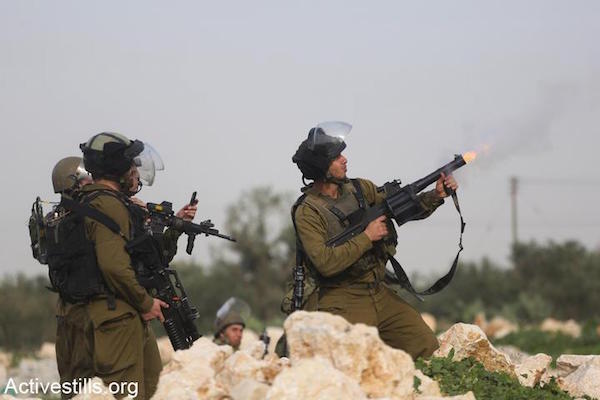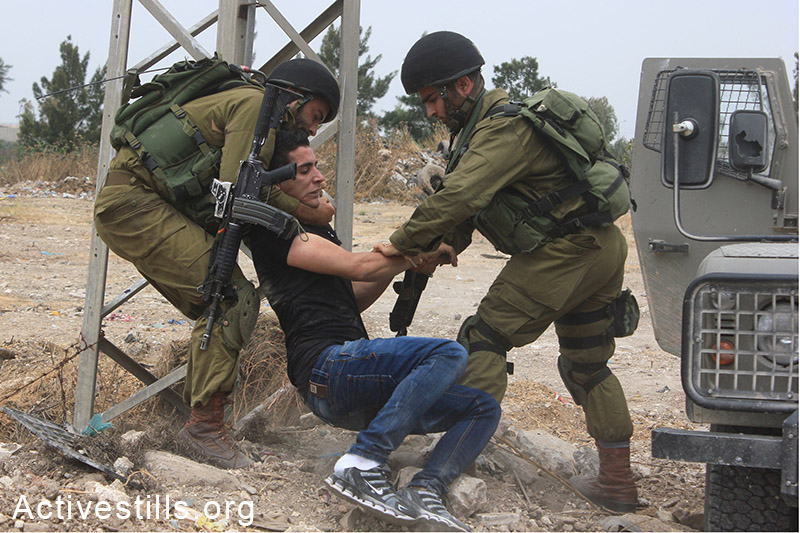When it comes to prosecuting its own soldiers, it seems the military investigation system is set up to allow the IDF to dodge accountability.
By Yossi Gurvitz, written for Yesh Din

Who is in charge of the military investigative system when soldiers harm Palestinians? This turns out to be a rather complex question that the IDF is at pains to answer. The running of the investigation itself is the responsibility of Military Police Criminal Investigations Division (MPCID), but it does not always decide whether to open an investigation. In cases of a suspected crime during operational activity, the decision over whether to open an investigation comes from the Operational Affairs Prosecution. Yet neither of these has any control over the way investigations are handled.
As we do every year, we recently published a data sheet about law enforcement regarding IDF soldiers suspected of harming Palestinians. This year, one critical piece of date point is absent: the IDF did not know how many complaints were lodged against its soldiers in 2014.
How did this come about? Well, let’s begin with the fact that a Palestinian who wishes to lodge a complaint about being harmed by soldiers cannot simply walk into an MPCID base and do so – for the simply reason that there are no MPCID bases in the West Bank. To lodge a complaint, a Palestinian must choose one of several paths, all of them twisted.
He can try to reach an Israeli police station in the West Bank, but in order to do so he would need a. an escort, as in some cases the station is within a settlement; b. hope there will be an Arab-speaking investigator on duty on the day he arrives, because there isn’t one as a matter of course; c. hope his complaint won’t get lost, and we have seen many complaints go missing on this journey.
Alternately, he can send the complaint through a human rights organization, which will pass it on directly to the military prosecution.
Why the prosecution? Because, again, MPCID does not always decide on opening an investigation; a decision by the prosecution is often required. Experience shows that this kind of decision can take months or over a year after the complaint is lodged. So instead of the complaint being turned over to MPCID, and from there to the prosecution before being returned to MPCID for investigation, it is better to lodge it directly with the prosecution. The latter — if it decides to open an investigation — will direct the file to MPCID; in turn, MPCID will send the file back to the military prosecution, which will decide whether to indict or send the file back to the MPCID for additional investigation, and then wait for it to be received again.
Thus, instead of two steps — a complaint to MPCID leading directly to an investigation, whose results are turned over to the prosecution — we have at least four: 1. A complaint reaches the prosecution. 2. The prosecution decides whether to open an investigation. 3. The case is turned over to MPCID, which investigates it. 4. The prosecution decides whether the investigation merits an indictment.
Now let’s add another variable: when the prosecution receives a report about a Palestinian being harmed, it opens a case and numbers it. When the case is turned over to MPCID for investigation, it gets a new number. When it returns from MPCID to the prosecution, it takes on a third number (a second prosecution number). Should it be sent to MPCID for further investigation, the file will be renumbered yet again.
That’s not a filing system. That’s a system for losing files.

Confused? Now put yourself in the shoes of a Palestinian who merely wants the soldier who hurt him to be investigated and punished. Now we can understand why the IDF does not have a clear idea of how many complaints were lodged against soldiers for harming Palestinians. The army can tell us it opened 229 investigations in 2014, but the military prosecution has no idea how many complaints or complainants reached it, because it does not differentiate between various kinds of information. It can receive “reports” from military units or from itself, which may refer to more than one event. Nor does it know how long any specific investigation lasts.
And that’s not the only problem — we’re only just beginning. Officially, the prosecution is supposed to oversee MPCID’s investigations. In practice, time after time it turns out it doesn’t have a clue. You ask about a specific investigation, and the prosecution simply has no way of knowing its status. In practice, to quote our data sheet, “the division between the two bodies creates a situation in which the IDF does not currently have one body which runs and centralizes the treatment of complaints, follows the advancement of the investigation and checking processes, measures the length of investigations and has a systematic view intended for heightening the effectiveness of investigations and their fulfilling.”
And so we find ourselves with cases like the investigation of the death of Musab Badwan Ashak Dan’a, where after three years of investigation the MPCID investigators had less information than they had when the investigation began, after managing to lose a medical file. And of course, no one at the prosecution was standing over their shoulder with a stopwatch asking what’s going on, because as things stand the prosecution has no clue as to how an investigation is going.
The Turkel Commission, which published its report in February 2013, noticed that IDF investigation procedures are not tight enough and demanded tighter controls and fixed time tables for investigations and prosecution decisions on cases. It realized that the element of time is critical: if an effective investigation does not take place within a short while, evidence will disappear and human memory will fade on its own, even without malicious tampering.
The Ciechanover Commission, which was supposed to rule on how to implement the Turkel Commission’s recommendations, recommended a period of 14 weeks maximum for the decision whether to open an investigation, nine months for the investigation itself, and nine more months for deciding what to do with the case. So far, the IDF has not implemented those conclusions, despite the fact that nearly three years have passed since the Turkel Commission Report was published. Feels like a standard MPCID investigation.
The time element is crucial for one additional reason: the Military Justice Law says one cannot try a soldier after six months since his discharge, or a year since the discharge in severe cases. This means that just like the examination of the case, its investigation, the re-examination of the investigation and the repeated re-numbering of the file are dragged out across many months, only increase the chances that even if the investigation does succeed, the prosecution would find it problematic to indict the felon, meaning the case will be transferred to a civilian authority.
The result of all this is a system that is not geared toward promoting accountability among soldiers; rather, it is a system geared to tell them everything will be fine, just count on us.
Written by Yossi Gurvitz in his capacity as a blogger for Yesh Din, Volunteers for Human Rights. A version of this post was first published on Yesh Din’s blog.

